
Theodosius Grigorievich Dobzhansky was an American geneticist and evolutionary biologist. He was a central figure in the field of evolutionary biology for his work in shaping the modern synthesis. Born in the Russian Empire, Dobzhansky emigrated to the United States in 1927, aged 27.
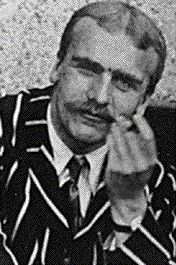
John Burdon Sanderson Haldane, nicknamed "Jack" or "JBS", was a British-Indian scientist who worked in physiology, genetics, evolutionary biology, and mathematics. With innovative use of statistics in biology, he was one of the founders of neo-Darwinism. He served in the Great War, and obtained the rank of captain. Despite his lack of an academic degree in the field, he taught biology at the University of Cambridge, the Royal Institution, and University College London. Renouncing his British citizenship, he became an Indian citizen in 1961 and worked at the Indian Statistical Institute for the rest of his life.
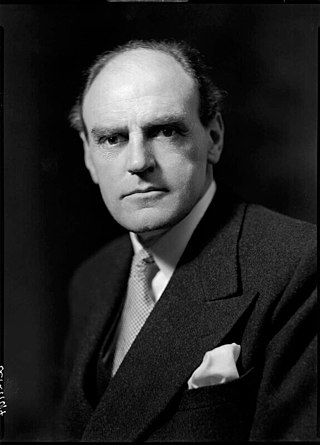
The Reith Lectures is a series of annual BBC radio lectures given by leading figures of the day. They are commissioned by the BBC and broadcast on Radio 4 and the World Service. The lectures were inaugurated in 1948 to mark the historic contribution made to public service broadcasting by Lord Reith, the corporation's first director-general.

Richard Charles Lewontin was an American evolutionary biologist, mathematician, geneticist, and social commentator. A leader in developing the mathematical basis of population genetics and evolutionary theory, he applied techniques from molecular biology, such as gel electrophoresis, to questions of genetic variation and evolution.

In biology, polymorphism is the occurrence of two or more clearly different morphs or forms, also referred to as alternative phenotypes, in the population of a species. To be classified as such, morphs must occupy the same habitat at the same time and belong to a panmictic population.
Balancing selection refers to a number of selective processes by which multiple alleles are actively maintained in the gene pool of a population at frequencies larger than expected from genetic drift alone. Balancing selection is rare compared to purifying selection. It can occur by various mechanisms, in particular, when the heterozygotes for the alleles under consideration have a higher fitness than the homozygote. In this way genetic polymorphism is conserved.
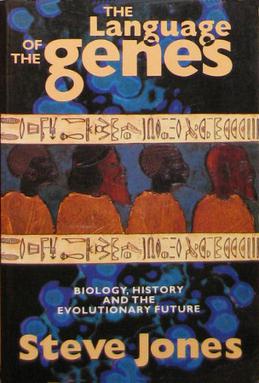
The Language of the Genes is a popular science book by Steve Jones about genetics and evolution. It followed a 1991 series of Reith Lectures by Jones with the same title. The book introduces all different aspects of genetics and molecular biology, and the new editions contain information about the frontiers of the field, such as the Human Genome Project. The first edition was published in 1993 and won the Rhône-Poulenc Prize.
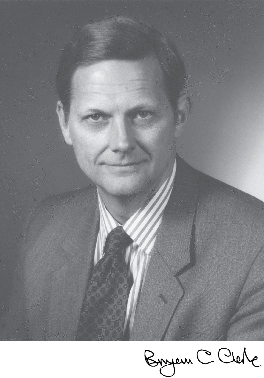
Bryan Campbell Clarke was a British Professor of genetics, latterly emeritus at the University of Nottingham. Clarke is particularly noted for his work on apostatic selection and other forms of frequency-dependent selection, and work on polymorphism in snails, much of it done during the 1960s. Later, he studied molecular evolution. He made the case for natural selection as an important factor in the maintenance of molecular variation, and in driving evolutionary changes in molecules through time. In doing so, he questioned the over-riding importance of random genetic drift advocated by King, Jukes, and Kimura. With Professor James J Murray Jnr, he carried out an extensive series of studies on speciation in land snails of the genus Partula inhabiting the volcanic islands of the Eastern Pacific. These studies helped illuminate the genetic changes that take place during the origin of species.
Simon Conway Morris is an English palaeontologist, evolutionary biologist, and astrobiologist known for his study of the fossils of the Burgess Shale and the Cambrian explosion. The results of these discoveries were celebrated in Stephen Jay Gould's 1989 book Wonderful Life. Conway Morris's own book on the subject, The Crucible of Creation (1998), however, is critical of Gould's presentation and interpretation.
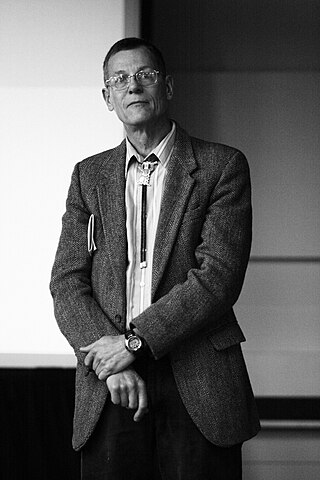
William Ball Provine was an American historian of science and of evolutionary biology and population genetics. He was the Andrew H. and James S. Tisch Distinguished University Professor at Cornell University and was a professor in the Departments of History, Science and Technology Studies, and Ecology and Evolutionary Biology.
Arthur James Cain FRS was a British evolutionary biologist and ecologist. He was elected a Fellow of the Royal Society in 1989.

The grove snail, brown-lipped snail or lemon snail is a species of air-breathing land snail, a terrestrial pulmonate gastropod mollusc.

The white-lipped snail or garden banded snail, scientific name Cepaea hortensis, is a large species of air-breathing land snail, a terrestrial pulmonate gastropod mollusc in the family Helicidae. The only other species in the genus is Cepaea nemoralis.
Ecology and evolutionary biology is an interdisciplinary field of study concerning interactions between organisms and their ever-changing environment, including perspectives from both evolutionary biology and ecology. This field of study includes topics such as the way organisms respond and evolve, as well as the relationships among animals, plants, and micro-organisms, when their habitats change. Ecology and evolutionary biology is a broad field of study that covers various ranges of ages and scales, which can also help us to comprehend human impacts on the global ecosystem and find measures to achieve more sustainable development.

Dr. Denis Alexander has spent 40 years in the biomedical research community. He is an Emeritus Fellow of St. Edmund’s College, Cambridge and an Emeritus Director of the Faraday Institute for Science and Religion, Cambridge which he co-founded with Bob White in 2006.
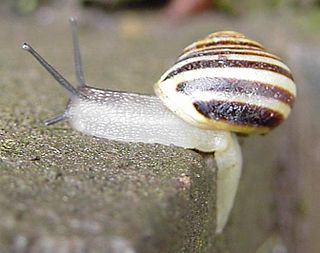
Cepaea is a genus of large air-breathing land snails, terrestrial pulmonate gastropod molluscs in the family Helicidae. The shells are often brightly coloured and patterned with brown stripes. The two species in this genus, C. nemoralis and C. hortensis, are widespread and common in Western and Central Europe and have been introduced to North America. Both have been influential model species for ongoing studies of genetics and natural selection. Like many Helicidae, these snails use love darts during mating.
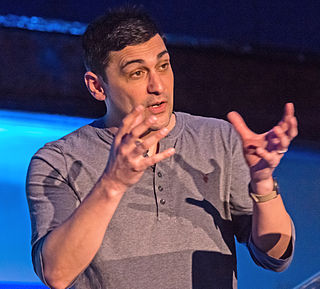
Adam David Rutherford is a British geneticist and science populariser. He was an audio-visual content editor for the journal Nature for a decade, and is a frequent contributor to the newspaper The Guardian. He hosts the BBC Radio 4 programmes Inside Science and The Curious Cases of Rutherford and Fry; has produced several science documentaries; and has published books related to genetics and the origin of life.

Macularia sylvatica is a medium-sized species of air-breathing dextral land snail, a terrestrial pulmonate gastropod mollusc in the family Helicidae. It was once seen as a close relative of the grove snail, but does in fact not belong to the genus Cepaea at all.
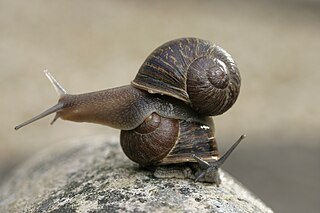
Jeremy was a left-coiled garden snail investigated by biologists. The snail had a rare condition which caused its shell to coil to the left; in most snails the shell coils to the right. At first it was thought to be a rare genetic mutation, although later work revealed that it was likely due to an accident in early development.















